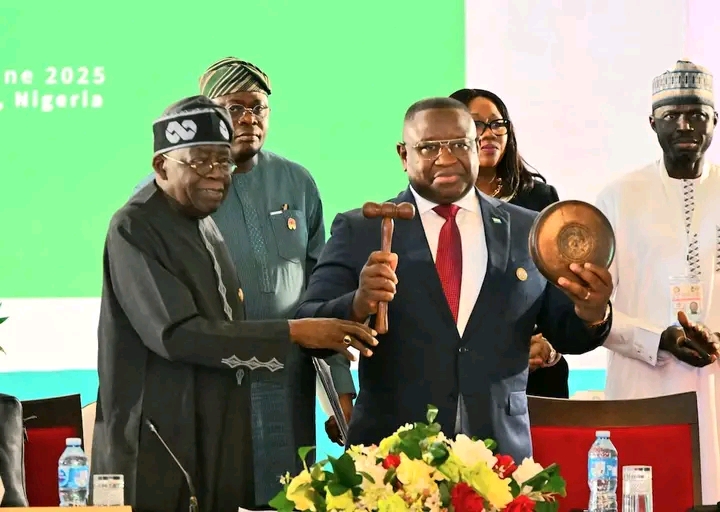News Analysis – By Abdul Lauya
In a moment rich with symbolism but steeped in regional urgency, President Bola Ahmed Tinubu of Nigeria on Sunday relinquished the chairmanship of the Economic Community of West African States (ECOWAS) to Sierra Leone’s President Julius Maada Bio at the 67th Ordinary Session of the Authority of Heads of State and Government in Abuja. The handover marks the end of a tumultuous era defined by security upheaval, democratic decline, and an existential test of ECOWAS’ regional cohesion.
President Tinubu, reflecting on his tenure, described it as a “profound honour,” while calling for unity, vigilance, and inclusive growth. Yet, his time at the helm will be remembered less for ceremonial strides and more for the aggressive but inconclusive push to reverse military coups in Burkina Faso, Mali, and Niger. Tinubu’s approach, marked by a firm defense of democratic norms and strong-arm diplomacy, including sanctions and the threat of military intervention, won commendation for principle, but exposed ECOWAS’ limitations in enforcing political will.
The response to the 2023 coup in Niger, where ECOWAS issued a stern ultimatum and imposed sanctions, encapsulated the high-wire act of Tinubu’s leadership. Though the bloc’s firm posture momentarily galvanized international attention, it ultimately failed to restore civilian rule or prevent the departure of Niger, Mali, and Burkina Faso from the bloc in early 2024. The creation of the Alliance of Sahel States by the three juntas not only undercut ECOWAS’ authority but exposed its diplomatic fragility in dealing with assertive military regimes.
Nonetheless, Tinubu exits with some credit. He kept the bloc together in the face of fragmentation, reasserted the moral necessity of constitutional governance, and laid the groundwork for inclusive regional dialogue. His emphasis on economic cooperation, youth empowerment, and institutional coordination reflected a vision of ECOWAS as more than a political body, but a community of shared futures. That vision, however, remains unrealized.
Enter President Julius Maada Bio, a leader with both the burden and opportunity to reset ECOWAS’ course. A former soldier turned democrat, Bio now steps into a role fraught with complexity but ripe for redefinition. In his inaugural speech, he pledged to lead a “people-centred and action-oriented ECOWAS,” outlining four key areas: restoring constitutional order, revitalizing regional security cooperation, accelerating economic integration, and rebuilding institutional credibility.
His tone marked a departure from Tinubu’s confrontational posture. Rather than isolation, Bio promised engagement, especially with transitional governments. He spoke of strengthening democratic institutions “rooted in the rule of law,” and stressed the need to overhaul the region’s security apparatus, including intelligence-sharing and rapid response mechanisms. The pivot from military threat to strategic partnership signals an attempt to recalibrate ECOWAS’ approach to governance crises.
Still, Bio’s aspirations must contend with grim realities. The region remains plagued by jihadist violence in the Sahel, transnational organized crime, illicit arms flows, and the growing disillusionment of West Africa’s youthful population. In coastal states, creeping insecurity threatens stability, while elsewhere democratic backsliding erodes public trust. Bio’s call for economic engines like the ECOWAS Trade Liberalisation Scheme and cross-border value chains to become tools for youth employment and resilience points to a broader recognition: peace is inseparable from economic justice.
Sierra Leone, while not a political heavyweight, brings post-conflict credibility and moral clarity to the ECOWAS chairmanship. Bio’s domestic record on reconciliation and institutional reform may offer a soft power advantage in rebuilding trust across a fractured region. Yet, his success will depend on his ability to unify a bloc that has grown ideologically splintered and diplomatically cautious.
The road ahead is steep. ECOWAS stands at a crossroads, haunted by the ghosts of coups past, yet nudged by the potential of reform and renewal. Tinubu’s leadership, though contested, reignited a critical discourse on what ECOWAS must be in the 21st century. Now, Bio must translate that discourse into action.
With democracy under strain, economic integration stalling, and security challenges escalating, the new ECOWAS chair faces an unenviable test. His leadership will either bridge the divide or deepen the drift. Either way, the stakes have never been higher for West Africa, and for the future of regional cooperation on the African continent.
For advert placement and inquiries, publication of press releases, and news coverages, please call: Phone: 08052898434 Email: editor@eyereporters.com, click here to view the advert rates.



